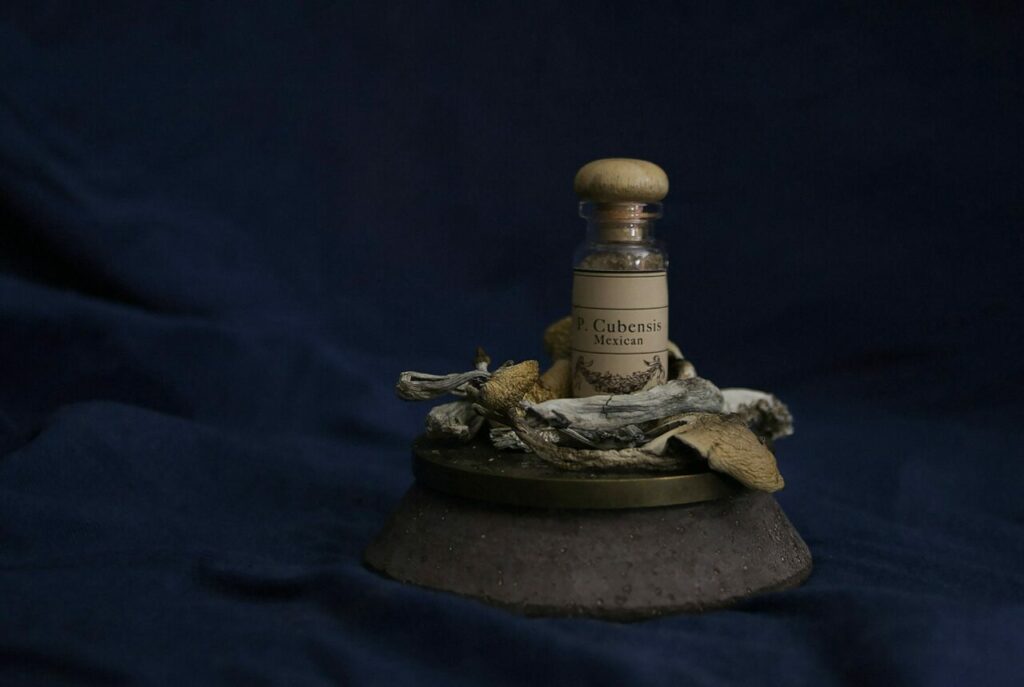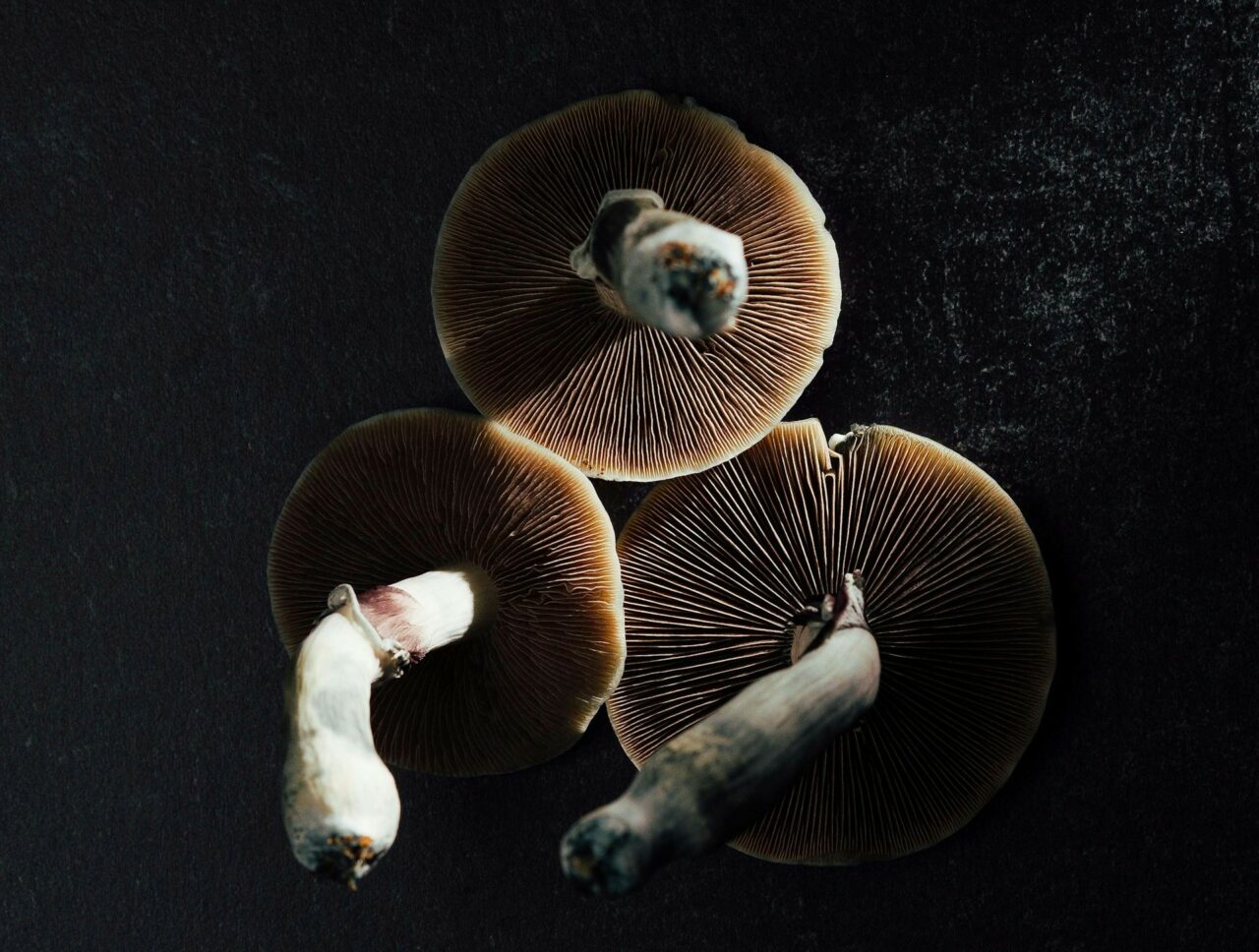The surge in interest for natural magic mushrooms in Canada has coincided with a rise in the popularity of lab-produced psilocybin products. These laboratory versions appeal to many researchers due to the guaranteed dosage they provide. However, it’s worth noting that naturally occurring mushrooms can sometimes have a higher potency than their lab-grown counterparts. There are crucial differences between the two, including variations in strength.

Key Takeaways:
- More than 180 species of natural mushrooms offer variable potencies, with the effects being influenced by factors such as species, consumption methods, cultivation practices, and individual tolerance.
- Lab-created psilocybin, a synthesized version of the natural compound, is produced in controlled settings to guarantee consistency and purity, particularly for use in mental health research and treatment.
- The combined effect of multiple compounds in psychedelic mushrooms, such as psilocin and baeocystin, can produce an experience that is more intense and profound than that created by a single compound.
Emerging Market: Diverse Forms of Psychedelics
Psilocybin mushrooms are gaining popularity in Canada, particularly for the treatment of specific mental health disorders including OCD, depression, PTSD, and anxiety. In light of this growing interest, provincial governments are contemplating the decriminalization of recreational use.
In 2020, Canada authorized limited medicinal usage of these mushrooms under certain circumstances. Just a year ago, the federal government granted permission for specific terminally ill patients to use these substances for symptom management.
These progressive steps have given rise to the advent of synthetic psychedelics.
The Ongoing Debate
The continuing discussion about organic versus lab-grown psychedelics focuses on factors like safety, availability, and cost.
Many people argue that natural psychedelics provide a more comprehensive and traditional experience. In contrast, supporters of lab-grown alternatives emphasize the benefits of standardization for medical usage, as well as the assurance of dosage control and quality.
While lab-engineered psychoactive substances could increase accessibility, there are ongoing concerns about the potential for drug monopolization. Critics warn this could result in less
This can lead to increased costs and reduced accessibility for users.
/wp:paragraph –>A Comprehensive Guide to Psilocybin
Psilocybe cubensis, a specific type of magic mushroom, is among the various naturally occurring psychedelic substances accessible today. The term ‘magic mushrooms’ refers to their psychoactive properties and includes multiple strains like Golden Teachers, Amazonian Cubensis, Blue Meanies, and others, with Psilocybe cubensis being the most popular.
Decoding the Psychedelic Journey
Psilocin, a compound derived from this mushroom, changes into a different chemical when metabolized by the liver. This transformed compound interacts with the serotonin receptors in the brain, particularly the 5-HT2A receptor.
This receptor is integral to mood regulation, cognitive functions, and perception. Its interplay with the transformed compound alters the normal functioning of serotonin pathways, causing changes in visual and auditory perception, thought patterns, and emotional states. Such changes can lead to an enhanced mood, sparked creativity, self-reflection, and the characteristic “psychedelic” experiences.
Main Two Categories
| Natural | Found in over 180 species of fungi, the potency of these substances can differ based on the mushroom species. Psilocybe cubensis is a frequently encountered variety. The effects can vary depending on consumption methods, cultivation practices, and individual tolerance. |
| Synthetic | These are lab-produced and chemically identical to natural compounds. They are synthesized in controlled environments to maintain consistency and purity. These are progressively being researched for clinical use, particularly in mental health treatments. |
Nature’s Offering vs. Scientific Invention: Key Differences
Natural variants of these substances are found in certain magic mushrooms. Native communities in North and South America have traditionally used these mushrooms in their rituals and ceremonies, treating them as sacred entities.
- Derived from plants and mushrooms
- Employed in ancient rituals and curative practices
- The unique genetic composition of each strain influences its potency
On the other hand, synthetic substances are
created in laboratory settings.
These substances are designed to mimic the natural chemical structure of specific compounds. Expert professionals in regulated environments meticulously engineer these drugs to ensure precision. While their performance mimics that of natural drugs, they have the potential to alter the overall psychedelic experience.
- Produced by expert pharmaceutical specialists
- Novel creations intended for medical use
- Defined potency due to the standardized manufacturing process
Natural substances may offer additional benefits due to their bioactive compounds. The content of psilocybin and other compounds can vary in different types of mushrooms, resulting in a range of effects.
Researcher Insights
A study done at the Hebrew University showed that psychedelic mushrooms have a more potent and long-lasting effect on synaptic plasticity than their synthetic counterparts. The researchers examined the influence of the drug on mice’s brain activity by studying changes in behavior and specific brain chemicals.
The study discovered that the extract reduced head twitches and promoted the formation of new brain connections. This suggests that mushroom extract may offer more advantages than a single compound.
The researchers also introduced the concept of the “entourage effect”. They described it as a phenomenon where the combined effect of multiple compounds in psychedelic mushrooms could surpass the effects of individual compounds. Within mushrooms, compounds like psilocin, baeocystin, and other tryptamines may synergistically contribute to an intense experience.
These additional compounds are absent in laboratory-created substances, resulting in minor variations in effects, despite identical psychedelic content.
Expert Opinions on Nature’s Superiority
Research consistently shows that psilocybin, irrespective of its form, offers promising outcomes for treating various psychiatric disorders. A 2024 study examining the effects of controlled substances on patients with treatment-resistant depression reported symptom alleviation after administering magic mushrooms.
When used alongside other treatments, organic psychedelics may facilitate more profound emotional processing and insights during therapy, thereby enhancing long-term results.
Researchers from the same university found that hallucinogenic mushrooms boost synaptic plasticity. They possess a distinct metabolic profile that affects oxidative stress and energy production pathways, unlike laboratory-created psychedelics.
Implications for the Market
The growing corpus of research on this subject could shape the perspectives and buying behaviors of Canadians regarding psychedelics. Early efforts by Health Canada, such as the Special Access Program, are demonstrating potential for paving a path towards legalization and revolutionizing the therapy landscape. Therapy assisted by psilocybin could soon become a prominent approach to treatment.
The importance of organic choices is anticipated to rise in the setting of clinical trials and therapies. As the country progresses towards fully harnessing the power of organic psychedelics, major strides in mental health treatment approaches are on the horizon.
Advice for Safely Procuring Shrooms in Canada
- Through Section 56 Exemption: Health Canada recognizes the potential of psilocybin as an alternative treatment for patients dealing with serious health conditions. This exemption is part of the Controlled Drugs and Substances Act.
- Clinical Trials: Initial clinical trials are approved to investigate the drug’s potential for treating mental health conditions. Participants must meet specific requirements and undergo screening by a physician.
- Online Market: Psilocybin capsules or edibles can be purchased from online vendors in Canada, but it’s important to buy from reputable sources.
Unveil the Power of Natural Compounds
Nature is full of marvels, and shrooms are among them. Instead of turning to synthetic psychedelics, consider using the naturally potent magic mushrooms from Canada. They are powerful and therapeutic. Explore the finest, naturally sourced shroom strains at Magic Mushrooms Ottawa Canada.
The shrooms we sell not only meet the standard, but they exceed it by retaining their most natural and authentic properties in their dried form. Place an order today, and get your chosen items delivered to your doorstep discreetly and conveniently.
Frequently Asked Questions
What are baeocystin and norbaeocystin?
Both substances are classified as tryptamine or indole alkaloids. They are chemically akin to psilocybin. These tryptamine derivatives act as secondary alkaloids in shrooms, contributing to the overall psychedelic experience, although to a less extent. Baeocystin and Norbaeocystin have a similar chemical structure but
The psychoactive properties of these substances can vary.
Are organic dried mushrooms present in capsules and edibles?
The experience may vary depending on the source. Products rich in organic compounds are offered by online dispensaries, which can provide a full entourage effect. Synthetic compounds, on the other hand, are often used in capsule form in clinical trials and healthcare settings.
Do natural psychedelics lead to more profound experiences?
One should note that expecting a profound experience from a natural psychedelic could potentially drive that exact result. This is because our expectations, forming part of the ‘set’, can shape the journey. Natural psychedelics are frequently linked with ceremonial traditions, and such ritualistic contexts can lead to uniquely fulfilling experiences. These experiences can be notably different from those involving synthetic compounds in clinic sessions.





